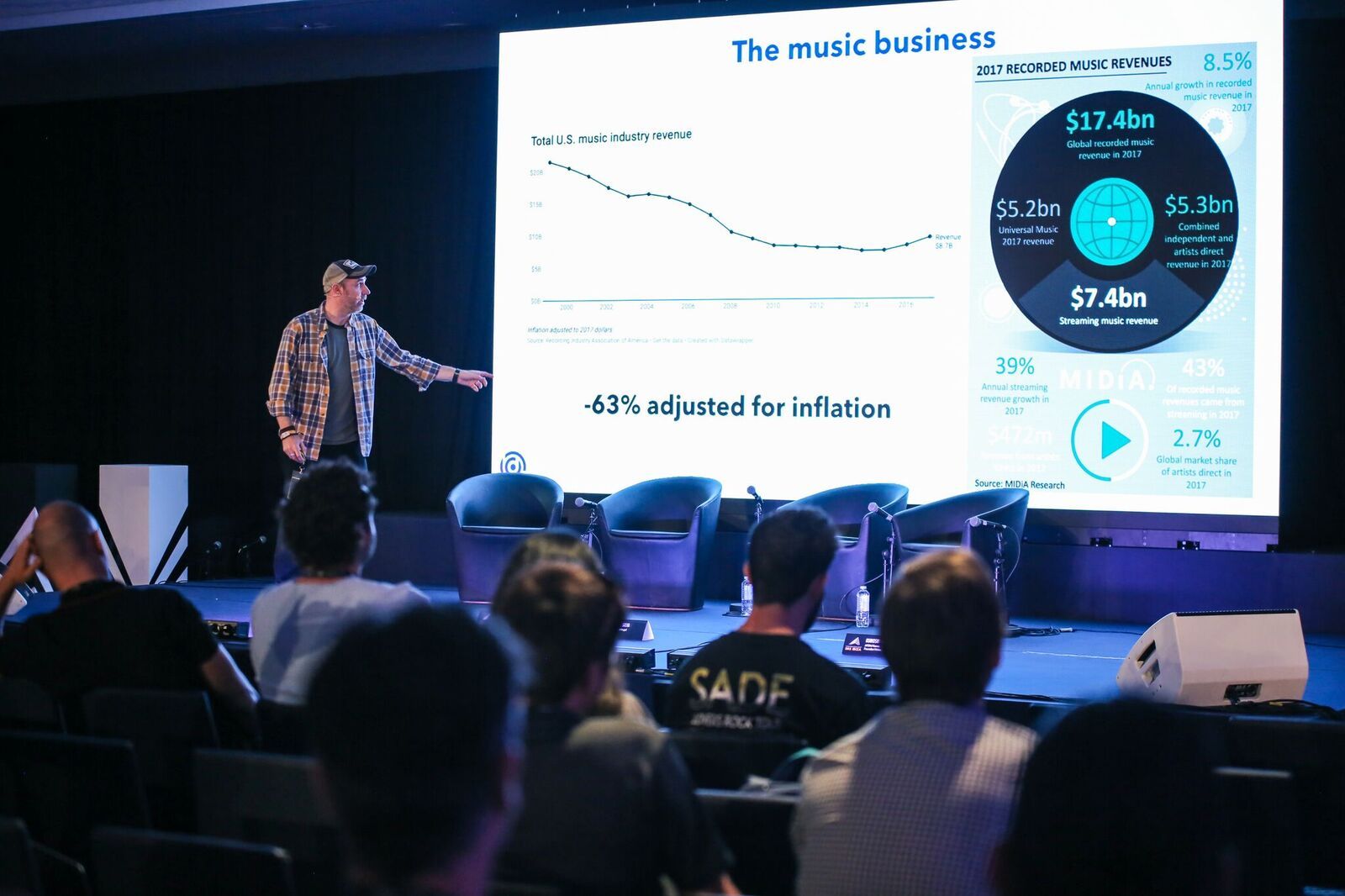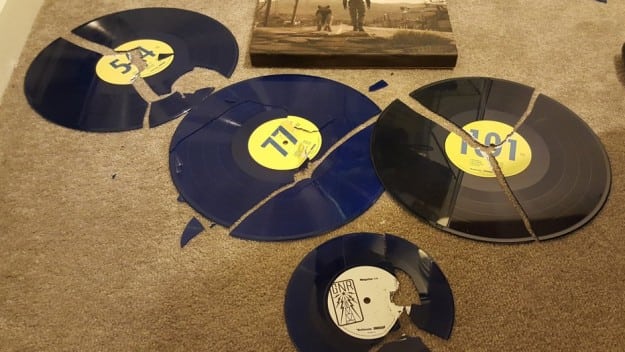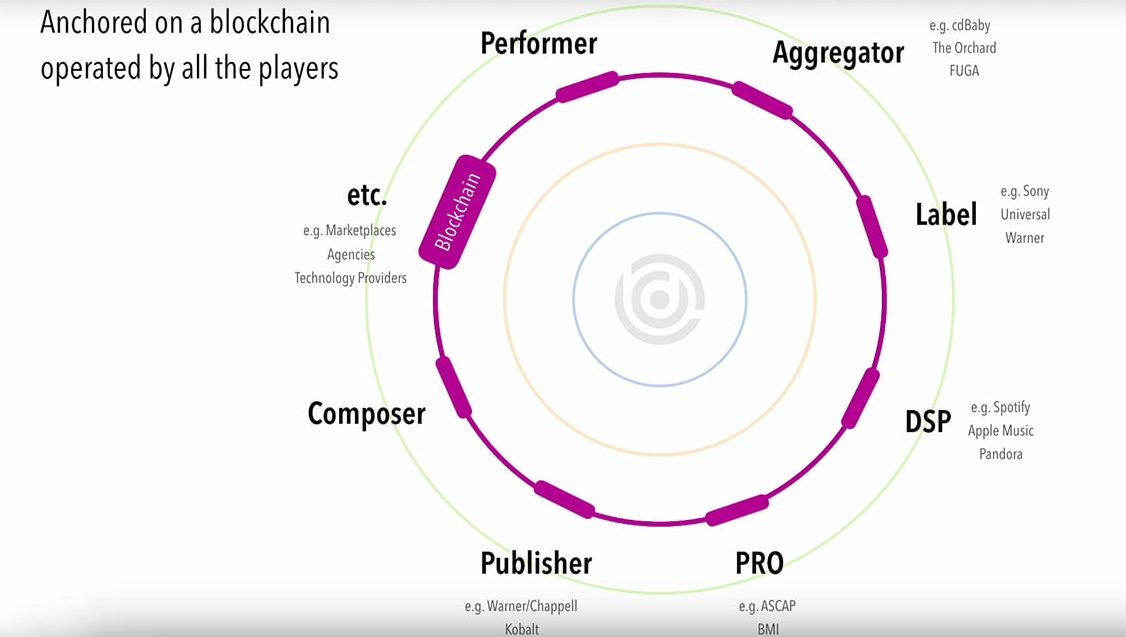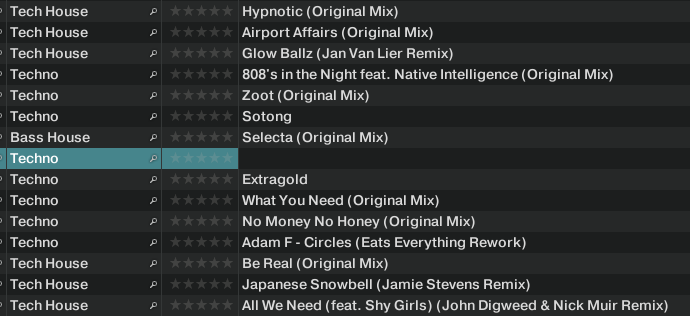If there is an emerging technology that seems to genuinely be on the tip of everyone’s tongue in 2018, it is blockchain. While often associated with cryptocurrencies, blockchain appears to be permeating every conceivable field, with downloadable music for DJs being no exception. We had a chance to learn more about a potential new file format for DJs at the International Music Summit 2018. Keep reading to learn what we learned from dotBlockchain Media’s Benji Rogers.
What Is Blockchain? A Quick Primer
Despite a great deal of volatility in the cryptocurrency market, blockchain is revolutionizing the world in ways almost entirely disconnected from Bitcoin and other currencies. Healthcare, property markets, and even a music festival presented by 3LAU all have made recent headlines with new and exciting uses of blockchain technologies. While the technology itself is becoming widespread, understanding it can still be somewhat difficult for the uninitiated.
To start, let’s do a quick overview of what the term “blockchain” means and why you should care.

“In the simplest of terms, blockchain is the underlying technology for currencies today such as Bitcoin and Etherem. Effectively, it is a way of storing transactions that is immutable. As I see it, there are blockchains for money and for data. They serve different purposes.”
– Benji Robers, dotBlockchain Media
Determining who would benefit most from the use of blockchain in the music business depends on how one chooses to use it. Rogers made the case that while people using the blockchain for currency may be disappointed in the long-term, there are plenty of benefits for musicians (and creators on the whole) should the industry begin to strategically implement it for data purposes.
A Battle of Old vs. New

Rogers asked the audience a bold question during his talk:
“Do you want your music to travel in 23-year-old file formats like .wav? Or, would you like to, at the inception of the music, digitally encode your rights information into a modern format?”
Artists getting paid has always been a point of contention for those of us who choose careers in music, and it would appear that Rogers and his company, dotBlockchain Media have set out to enlist the help of the blockchain in ensuring fairer marketplace.
Rogers recalls the early days of the MP3, and how many DJs actively fought against it. While vinyl purists have been having a field day recently, the shift from physical to digital mediums was a very recent industry transformation. “The music industry thought MP3 was a virus when arguably it was a vitamin,” Rogers recalls. “Blockchain, however, would be megavitamin.”

How Can Blockchain Help Pay Creators
The goal of dotBlockchain Media is to use smart-encoded, blockchain-powered file formats to ensure that artists are receiving their fair keep when it comes time for royalties to be distributed. “There are no problems paying people, but there are problems identifying who to pay.” While payment structures are well established within the industry, it is not always the most straightforward task identifying who is to be paid.
When a track is moved between different stages of distribution throughout the music ecosystem, it can be all-too-easy for metadata that includes all the contributors to the track to get lost in the process. A blockchain-based file format would allow a tracks’ metadata to be preserved and cross-checked for consistency at all stages. This would ensure everyone involved gets proper credit, payment, and more.

For example: accidentally clear out a track name in DJ software, and you may have a difficult time getting it back. While this is but a micro example, it is just as easy for any wannabe producer to bootleg an existing record, changing very little, and then claiming all the credit. On a large enough scale, this equates to an untold amount of losses for artists. This can happen at radio stations or on streaming platforms as well – where the scale of a library can make it all too easy for mis-labeled tracks to go unnoticed.

Dotblockchain’s website states that their intended goal is to: “develop a new media format and supporting technology architecture.” Could it be that shortly, we’ll all be downloading .bc instead of .mp3 or .wav to play in our sets? Despite dubious headlines last year stating that the .mp3 is dead, we all know that is hardly the truth. However, based on the meteoric rise of blockchain from a relatively unknown technology into a household term, it’s easy to imagine that innovative minds could quickly turn this into a common file format for DJs.
What Could It Mean For DJs?
Think broader than just artist and creators getting proper payment and credit on tracks – what other metadata could be easily moved around between different stages of the process that could benefit DJs? Here’s a few thoughts:
- waveforms / beatgrid / key analysis data (which take up some time and power to do on local computers) could be done once and shared among every DJ with the same .bc file for a track
- cue points/loops/Serato Flip metadata could be shared and updated – this could even be done on smaller scales, like within digital record pools to create extra value for members
- creators and labels could know when a track has been played inside of DJ software with blockchain based reporting (right now, most DJ software only shares that information when DJs manually export it and post it online)
- bitrate and recording quality could be verified more easily, instead of having to use third party tools like FakinTheFunk
There’s also always a question of compatibility with new formats – even FLAC, a well-accepted industry lossless format, had issues being quickly adopted by DJ platforms. One must wonder if a .bc file would be universally supported by Rekordbox, Traktor and Serato, how big the files themselves will be, and if something as complicated as a blockchain encoded music file could cause the dreaded software instability that plagues DJs from time to time.
This technology is in its infancy. That said, regardless of how far along it is in development, innovative new signs of promise are showing up for DJing and the music distribution world as a whole.
In closing, Rogers left us with one humorous takeaway. “Blockchain is 99% bullshit and 1% game-changing ideas.” With any luck, he and his team may just be in that 1%.





